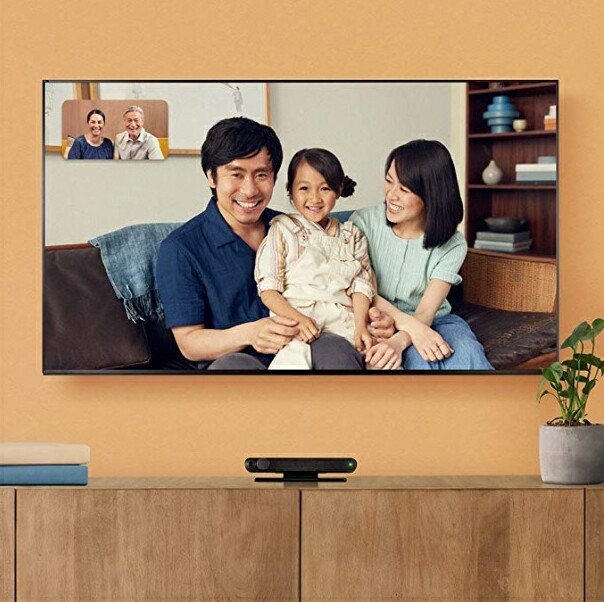Facebook’s Smart-Trick Pony: Portal TV

Whether Facebook wants to publicly say so or not, the social media powerhouse is now the new kid on the smart TV device block, up against the likes of Google Chromecast, Amazon Fire TV and Roku. Portal TV, introduced to consumers last September as a one-trick-pony video-chat device available for $149 and accompanied by a splashy multimedia campaign featuring The Muppets. But it has swiftly become something much more. Over the last six months, Facebook’s product now features a variety of programming services and applications. There’s content from Amazon Prime Video, CBS All Access and Fandango Now (more than 100,000 movies and TV episodes on-demand); audio from Spotify, iHeartRadio and Pandora, games like Words with Friends (a rare move by parent Zynga into TV) and Battleship, and what are believed to be the first TV features incorporating augmented reality anywhere.
Yet half a year in, Facebook is not disclosing much about Portal TV sales or public reaction. In fact, the company’s press release on its latest quarterly results, out earlier this month, contained no Portal TV info whatsoever. Ditto the investor conference call with Facebook management. And in January, the company skipped CES, the ultimate annual consumer electronics showcase in Las Vegas, where Portal TV might have captured some industry momentum.
As for promotional tactics, those Muppet ads still pop up on YouTube and in Facebook news feeds that continue to emphasize the video chat element. “Smart video calling on the biggest screen in your home” and “If you can’t be there, feel there,” are the current tag lines, with new Portal customers getting up to 30 percent off the price through Valentine’s Day.
Ironically, what Portal TV burst on the scene with -- a better way to make video chat work on the TV set incorporating state-of-the-art micro cameras with its attachment -- appears to be behind the sedate rationale of Facebook leadership over generating buzz in public. With ongoing controversy about the company’s data-crunching tactics and impact on user privacy, stemming from the Cambridge Analytica mess and related issues, Portal TV’s chat feature can get construed as the newest way to reap user data for nefarious purposes.
Published reviews of Portal TV harp on that point, even when the reviewers declare the product works beautifully. Check out these comments from USA Today tech columnist Jefferson Graham. “I don’t like the idea of granting my TVs access to Facebook and allowing the social network to install a video camera and microphone in my living room,” he wrote last November. “But I’ve got to admit that (Portal TV) is, hands down, the best video chat device I’ve ever come across.”
“It’s a complete anomaly,” noted CNET News.com product tester Megan Wollerton in her November review. “A solidly performing, decently priced device that just isn’t suited for anyone because of the privacy concerns and increasingly alarming issues plaguing the social networking site.” Indeed, the headline of her review insists no one buy Portal TV.
A video posted on Facebook’s Web pages devoted to Portal TV addresses these criticisms. As people are seen connecting to each other on camera, or enjoying top tunes together, a voice notes that the product is “private by design,” with all video calls encrypted. If at any time the user at one end of the call wants to disable their video camera and microphone, or block their camera lens, they can easily do so.
The video also calls attention to its augmented reality apps as consumer-friendly communications tools. When someone at either end of the chat connection wants to tell a story to children present, an animation feature can be clicked to turn that person into a character from the story, complete with appropriate backgrounds. Other AR features allow the connected parties to play games or try on masks.
If Facebook has any chance to be a player in the smart TV device world, Mark Zuckerberg and company must take every chance available to earn the trust of consumers and critics. Keeping silence or maintaining a low profile with Portal TV will get them nowhere. Time to take a lesson from Johnson & Johnson when they faced their Tylenol crisis decades ago. Management there didn’t go mum; they used every tactic available to acknowledge the problem, take actions to correct it and move forward. Some public demonstrations and conference calls with press in New York and other major markets that show off Portal TV’s full and upcoming capabilities, and include customer testimonials, can be a start. A new round of Muppets ads might try delivering the same message.
Some upcoming competition, also with a video-chat focus, might spur Facebook on. Los Angeles-based Solaborate picked up $10 million in funding for a smart device they want to launch by the end of 2020. Labeled Hello, this camera-inclusive product would deliver a variety of video chat and conference formats, including Google Hangouts, Zoom, We Chat and Facebook’s Messenger. Besides chat, Hello will feature programming services, games and automated controls for other home/apartment devices.
Further, Solaborate’s web site includes this statement from founder and chief executive Labinot Bytyqi: “We believe that privacy is a fundamental human right, and that’s why we engineered (Hello) with video and audio built-in, hack-proof privacy controls and end-to-end encryption for everyone’s protection and peace of mind.”
Click the social buttons above or below to share this content with your friends and colleagues.
The opinions and points of view expressed in this content are exclusively the views of the author and/or subject(s) and do not necessarily represent the views of MediaVillage.com/MyersBizNet, Inc. management or associated writers.


